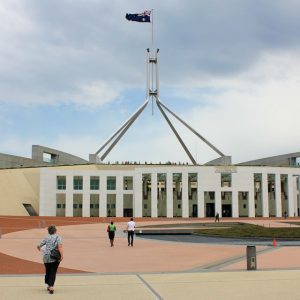By Laurie Ferguson*
I have been asked to provide a personal analysis of change and experiences in my 31 years in the NSW and Commonwealth Parliaments.
The first aspect that struck me as a Parliamentarian in 1984 was the lack of mentoring that occurs with the job. Especially if you have a strained relationship with your predecessor or have captured the seat from another party, this can be especially relevant.

Whilst some MPs might have had management experience I had worked as a research officer with a union. In those days, people were paid weekly and officials socialised around that day, after city meetings. You could toss around issues with colleagues and get ideas. All of a sudden you were on your own!
Another striking aspect was that in my previous working and student life, I had been cocooned from the high numbers of citizens with mental illness. Their prospects of holding down employment in the unionised workforce I encountered were low so it was a rude awakening to encounter the prevalence of citizens with very real problems.
If I reflect on the differences between State and Federal politics, the three points are:
- the loss of some connection with constituents and local Party members occasioned by larger constituencies and more travel,
- the far superior research capacity of the Commonwealth Parliamentary Library vis-à-vis that of the NSW Parliamentary Library, and
- the reality that on the state level you know many colleagues before arriving in Parliament.
In the NSW Parliament, ou were also working in a far smaller building, where MPs essentially lived on top of each other. This made for a far greater level of socialisation.
A major change in politics has been the enhanced conformity, mindless sloganising and discipline of the parties. This has been precipitated by the various leaders’ centralised control and the crassness of political “journalism”. The latter means any expression of debate inside a party is put down to deep division and wild crisis.
‘Reality TV show for the reporters’
For much of my early time, the Left faction endlessly met and discussed matters. It actually appointed people such as Senator Bruce Childs. to issue public statements of the group’s views. The Right and Centre Left acted similarly. MPs at doorstops gave their own views and people found a level of genuineness.
Now each morning the major parties provide speaking notes which select MPs regurgitate. Party propaganda pure and simple! A culture has spread that repeating the same slogans constantly will penetrate the public mind.
It reached the ridiculous situation under the NSW Labor Government where MPs’ newsletters to constituents were dictated from a central point, with a little block for the MP’s own presence.
The emergence of Sky TV and social media clearly adds to the trivialisation and demands for excitement. Politics is today a reality TV show for the reporters. It is bizarre to see them leaning forward to see what MPs are wearing, who has moved seat, or waiting for an email from an MP in response to their own ‘twitter’ during Question Time itself.
Press gallery declines into conformist mob
The decline of individuality within the press gallery into a herd, conformist mob is apparent. Similarly, if they are not there for trite or gossip, another significant grouping of journalists is habituated partisan polemicists on both sides of politics. The Lenore Taylors, Laura Tingles, Ross Gittins, Malcolm Farrs and Mike Seccombes are a disappearing species. The turnover of journalists also ensures that their corporate memory is minimal.
On the Labor side, policy committees that largely conform to ministries have been replaced by super committees covering many portfolios. They tend to hear a brief report on pending legislation and approve the already-agreed Shadow Ministry position. It is my recollection that in the early 1990s these committees sometimes undertook wider inquiries and were certainly more focused on narrower policy areas.
That development has been accompanied by the proliferation of a myriad of informal medical/diseases committees. It is my guess that there are about 50 of these interest groups, always bipartisan, that take up funding issues, listing of pharmaceuticals, reports on related medical research. etc. They vary in quality and some are essentially adjuncts of the pharmaceutical industry. However, whilst most are commendable it really cuts down into time for other Parliamentary activities.
Another voluntary committee change was the unfortunate decision to amalgamate national inter-Parliament friendship groups and go to regional groups eg. South America, Eastern Europe etc. The former seldom met but enhanced interaction between Ambassadors, and connected with migrant groups and those interested in a particular nation. I am pleased to see we are returning to the old system.
On the Parliament’s own committee system, extensive cutbacks on the Parliament’s finances has led to decline of staffing numbers and related decline of the various secretariats to function properly. At the same time Ministerial offices’ employees have multiplied.
Emails present real challenges
The proliferation of emails has presented real challenges to the political process. Campaigns are capable of producing a huge avalanche of correspondence. When this stems not from specific activity by the individuals but from them originally signing up to a broad lobby group to send as they choose, there is no real guide as to how committed this large group of people is to the particular cause.
The act of a telephone call or, more particularly, the sending of an individual letter and, to somewhere near the same level, an email that is personal, not pro forma, displays a level of concern on an issue. How you can gauge these email campaigns is difficult to conclude. Email campaigns can also give a distorted view on overall views in the electorate, over and above the intensity of the real opinions.
This is a far cry from untargeted catch-all letters to voters that were produced from outdated electoral rolls. The electoral rolls are updated every month to MPs and registered political parties, who have developed computer programs such as Electrac (now Campaign Central).
These monthly updates also remove people automatically from the electoral roll who have moved to another electorate or died (by a process involving the NSW Department of Births, Deaths and Marriages). They also add new people who have changed their address, have turned 18 or become Australian citizens. The system has been expanded to allow for any changes to driving licences to be incorporated in updates on the electoral rolls.
The list of the addresses and names of electors is able to then be used to record who raises issues, has an interest in matters and likely voting intentions. This facilitates incredible advantages to MPs who can send direct, personalised letters to voters, given an expanded budget for postage and print.
Another development has been the emergence of the Greens and proliferation of Senate representation for smaller groups. The Greens represent a threat to the Left of Labor’s base and the quandary of how Labor attempts to hold this constituency, which now has a party that niche markets its policies to specifically hold this section of the electorate, free from the responsibility of ever having to make Government decisions.
The rise of the Greens has incorporated a huge number of progressive Australians who were once active inside the Labor Party. Many younger Greens would also once have been ALP branch members. This, with the general decay in citizens’ participation in social groups, undermines the political parties’ connections with the electorate and enthusiastic workers, and reduces the viability of local branches.
‘Stream of manipulative …characters’
Whilst the Greens – and previously the Democrats – were legitimate groups representing a portion of our society, Upper Houses have also gained a stream of manipulative characters who essentially are accidents. Nevertheless they wield enormous power due to Labor or Liberals not having control of these Houses.
We have parties with whatever label – beer drinkers, recreational users, no land tax, people against parking fines, etc. They register attractive names as parties, then have meetings to arrange registered How-to-Votes, exchanging preferences amongst themselves. People who vote for this or that party find themselves electing who knows what.
The major parties need to get their heads together and construct reforms to overcome this fraud. Whether it is by changing the rules on what constitutes formal votes or requiring parties to have a minimum starting percentage to be elected, like Germany’s 5%, it needs to happen.
A positive change has been the readier engagement of young people in direct lobbying around climate change, development funding, poverty alleviation, recycling, etc. Whether it is in the meetings at the electoral office or delegations and forums in Canberra, their keenness and engagement are inspiring.
ENDS
 Laurie Donald Thomas Ferguson (born 7 July 1952 and brought up in suburban Guildford in Sydney) was a Labor member of the House of Representatives from March 1990, representing Reid until 2010 and Werriwa until May 2016, both in NSW. He was the member for Granville in the NSW Legislative Assembly 1984–90.
Laurie Donald Thomas Ferguson (born 7 July 1952 and brought up in suburban Guildford in Sydney) was a Labor member of the House of Representatives from March 1990, representing Reid until 2010 and Werriwa until May 2016, both in NSW. He was the member for Granville in the NSW Legislative Assembly 1984–90.
He is a member of a Labor Party–union dynasty, and son of Jack and Mary Ferguson. Jack was deputy premier of NSW 1976–84. Laurie’s brother Martin was also a federal MP. His younger brother, Andrew, was the former NSW Secretary of the Construction Forestry Mining and Energy Union (Construction and General Division).


Some thoughtful reflections.
I would be nowhere near Laurie in many policy areas, however, there are so few pollies that can empathise with the ‘poor souls’ that our society throws up and that get flung about and churned by a system that has little or, often, misdirected hearts.
Managerialism is what Laurie talks, even if not by name. Everything is reduced to a ‘how do we manage’ rather than solving systemic issues.
A sad loss from the parliament.